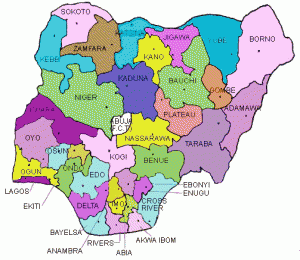The call by the Governors’ Forum for the scrapping of the petroleum subsidy is understandable in a way, but it is ultimately not the solution to their monetary constraints. The Federal Government subsidizes petroleum imports amounting to almost a trillion naira a year and the governors want to access that money to enable them pay the new minimum wage of N18, 000. However, deregulation of an inefficient downstream petroleum sector will see prices at the pump rise and the consequent effect will wipe out the gains of the new wage, taking us back to square one. Why should deregulation take place when we produce crude, but still import petrol because our refineries can’t cater for domestic demand?
The issue of minimum wage is a symptom of a greater ailment. It is not possible for the President to fix a road on a side street in Surulere, or to deliver a borehole to a community somewhere in Adamawa. That is why we have the state and local governments, whose job it is to take development closer to the people, because transformation of the states will speed up the transformation of the country. Under the current revenue allocation formula, which came into being in March 2004, the Federal Government takes 52.68% of revenue; states take 26.72% and the local governments 20.60%. This concentration of resources and power at the centre has negative implications for the country. It leads to everyone scrambling to the centre for patronage and simultaneously gives state and local governments excuses for lack of performance. The revenue allocation formula needs to be reviewed urgently, to help the other tiers of government meet up with their obligations. Already, a showdown is brewing in some states over the minimum wage. Another issue is the fact that allocations for states and local governments are paid into a joint account, which also hampers the councils. This needs to end. In the long term, states really shouldn’t depend so heavily on what they get from the federation account. Sharing money among the three tiers of government is to blame for the lack of innovation from many governors. States need to develop their own revenues.
Our lawmakers enjoy excessive allowances, which has been the focus of much of public discourse. Over the next four years, 469 federal lawmakers are set to get N339 billion, but there is a proposal in the Senate to reduce that by 40%. A recent analysis shows that current allowances are over a 1000% of the basic salary, therefore a big reduction in that figure is a priority and hopefully it is implemented. This is, however, only a tip of the iceberg. Between January 2010 and March 2011, the Bureau for Public Procurement reported that it saved the nation N216 billion from costs of contracts awarded by Ministries, Departments and Agencies. Apart from this, so many MDAs have overlapping functions and should be merged or scrapped outright. For example, why do we still have a Ministry of Information in 2011? Why do we have the NDDC and a Niger Delta Ministry? These are sources of waste. How much is allocated for ‘security votes’ to the President and Governors? Why should such votes even exist at all? Then there’s the matter of the large number of Ministers, Commissioners, Special Advisers, Senior Special Advisers and so on.
Reducing the waste in our governance has to be a paramount concern, because there are urgent challenges that need those resources. For example, UNESCO recommends that countries spend 26% of budget on education. Despite education getting its highest ever allocation of N350 billion, that figure only amounts to less than 8% of budget. The African Union recommends 15% of budget should go to health, but Nigeria spends 7%. Doctors aren’t paid well enough, neither are teachers, neither are policemen. Every sector suffers because of the resources are being wasted in an obscene fashion at the centre.
One of the biggest achievements that is possible in the next four years is to reduce the waste that occurs at all levels, have full disclosure about how much our democracy costs and to give states and local governments more resources to develop their constituencies, for which they will be more accountable.
For too long, Nigerians have put their hopes on the federal government with nothing to show for it. The time to spread the responsibility of governance, and the resources necessary for its running, is now.

